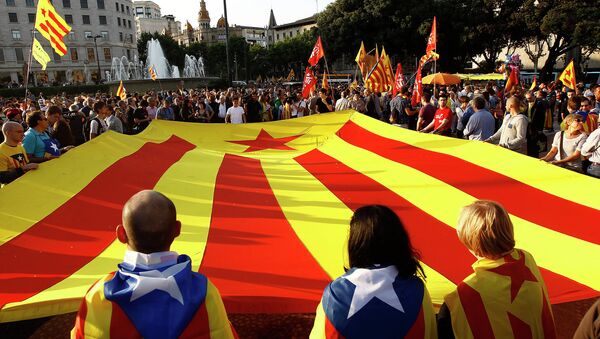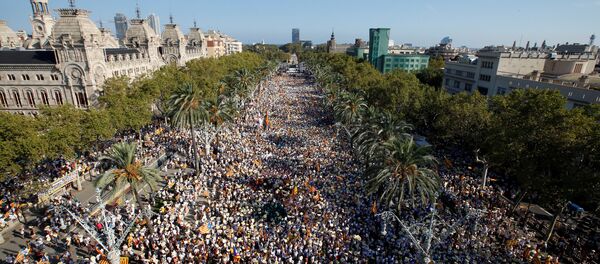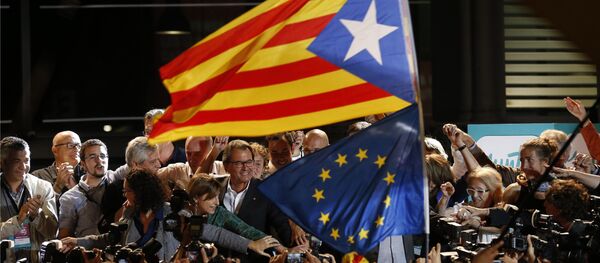On Thursday the Catalonian parliament approved plans to hold a referendum next September on the issue of independence from Spain, despite opposition from the national government and Constitutional Court in Madrid.
Last week President of Catalonia Carles Puigdemont said that he was open to negotiating the terms of a legally binding independence vote, but said the referendum will take place regardless of whether Madrid forbids it.
The Spanish government, led by acting Prime Minister Mariano Rajoy, has repeatedly refused requests from Barcelona to hold a referendum on the issue, and has successfully appealed to Spain's Constitutional Court to strike down Catalonia's plans as unconstitutional.
Dr. Carlos Flores Juberias, a constitutional law professor and political analyst at the University of Valencia, told Radio Sputnik that the chances of the referendum being recognized by the Spanish parliament, Constitutional Court, or EU institutions are "literally zero."
While Catalonia's President Puigdemont maintains the vote will go ahead, the region is lacking the infrastructure to ensure a fair vote, including an accurate census, systematic control of the electorate and the counting of votes.
"None of this is going to be available for the Catalan President, so the most likely scenario is a repeat of the November 9, 2004 consultation. Basically they show a fake referendum in which only the faithful who are blatantly in favor of independence will show up and vote. Therefore, the likely scenario will be again 37 percent turnout, 99 percent of votes in favor," Juberias said.
"None of them would provide Catalonia with a better democracy than they have now. They are very poorly drafted, very contradictory, they are full of mistakes."
"Ambiguity is a card being very intentionally played by Catalonian nationalists," who are reluctant to lose some supporters by settling on a specific constitutional arrangement for Catalonia's future.
"There is an endless number of promises. Catalonia will be able to pay all its debts, will be a safe place, will be able to secure our frontiers, we will be able to pay for social security, we will increase unemployment benefits and so on."
Juberias draws a comparison with the Brexit referendum, where leave campaigners have failed to come up with a detailed blueprint of post-Brexit UK, including the central issue of whether the country will retain access to the European single market.
"It's kind of like the Brexit campaign in the UK, (which promises that) 'once we leave the UK, all that money will be in your pockets and we will be a wealthy country.' Well, you discovered that when you leave the EU certainly you save money, but you have more expenses. This is again something that is being played in the Catalan nationalist push."
"Some observers jokingly refer to this golden future as 'Catadisney,' it's certainly a fantasy place that doesn't exist anywhere."
Juberias says the decline is a result of disenchantment with regional politicians who have not been delivering on their promises about independence.
He thinks that Catalonia's separatist politicians are intent on stringing out the campaign process rather than really gaining independence, which would force them to work out a concrete vision for the future.
"One is very tempted to believe that the real goal of the nationalist parties in Catalonia is to keep this tension going. For as long as there is tension, they will be able to stay in power, they will be able to press Madrid and they will be able to benefit from the support of many citizens in Catalonia," Juberias said.




